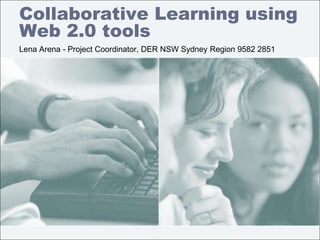
Web2 2010
- 1. Collaborative Learning using Web 2.0 tools Lena Arena - Project Coordinator, DER NSW Sydney Region 9582 2851
- 2. Web 1.0 vs Web 2.0 Internet was once mostly about surfing from one static Web site to another while collecting or viewing data along the way (Web 1.0) Web 1.0 a digital library, largely a source of information wwww – whatever, wherever, whenever, whoever. The read-write web Web 2.0 users share information, collaborate on content, and converse worldwide via social-software tools.
- 4. Web 2.0 tools Blogs Wikis Social Networking Social Bookmarking
- 5. Web 2.0 tools Tagged Photo Stores Podcasts and vodcasts Micro-blogging RSS Other free Web 2.0 tools
- 6. • Blogs (short for web logs) are online diaries. • Blogs are Web sites that allow instant communication and publication and allow for feedback from readers. Blogs https://www.det.nsw.edu.au/blog/670913-dernswsydneyregion/
- 7. • A wiki is a communal, subject- specific Web site where users can add and/or edit content. • Wikis enable groups of students, teachers, or both to gather content and share written work. Wikis http://www.wikispaces.com
- 8. • Real Simple Syndication are called “feeds”: programs that take content from various Web sources—news sites, blogs, online journals— and deliver it in summarised form to the user (you!) • In order to subscribe to RSS feeds, you need to download RSS reader software or use a Web- based RSS reader. This allows you to access all your feeds in one convenient location. RSS http://www.netvibes.com/carena#General
- 9. • This allows students and teachers to build a list of favourite websites they can share via the web and pass on to future classes. Social Bookmarks http://delicious.com/c.arena http://delicious.com/sharonmcg/
- 10. • Podcasting enables Web sites to provide visitors with audio and/or video recordings that can be downloaded to a local computer and watched at any time and/or listened to on-line. Podcasts & Vodcasts http://aussiekids.podbean.com/
- 11. • “social content-sharing sites are sites where members create profiles, network, and share opinions, photos, and audio-visual content”. • Facebook (150 million users worldwide from 170 countries and in 35 different languages ) • MySpace • Bebo • Yammer • Twitter Social Networking https://www.yammer.com/det.nsw.edu.au
- 12. • Facilitates critical analysis and participation in publishing • Allows the creation of educational communities to store and share knowledge • Enables student reflection on learning • Allows celebration of student success • Increased motivation of students with a wider audience Why Web 2.0?
- 13. • Great motivator for students • Easy to monitor • Allows for creativity and innovation • Encourages participation of all students • Promotes communication between students, teachers, and parents • A new, interesting way to learn Why use a wiki?
- 14. • It’s a very easy to use online collaboration tool. • It can be used by students to track their understanding on the subject you are teaching – (i.e. Literature character study, collaborative creative writing, current events, etc.) • Peer-reviewed projects • Group projects • Collaborative problem solving Why use a wiki?
- 15. • Public • Anyone can view and edit your wiki • Protected • Anyone can view your space but only members can edit • Private • Only members can view or edit your space Types of wikis
- 16. • Wiki is an example of Web 2 social software. • They can provide an eLearning environment in which teachers and learners can maintain control over, and input into, their own learning. • The software provides flexible access to resources and fosters collaboration in a way that enriches educational delivery. • Wikis can be used to stimulate thinking outside of regular class time or as the basis for beginning new classroom discussions and coming up with new ideas. • The majority of research findings conclude that social software tools can be a transformational technology for teaching and learning. Are wikis appropriate for educational delivery?
- 17. • Wikis are a tool supporting a social constructivist theory of learning. Social constructivism, a variety of cognitive constructivism, contends that knowledge is actively created by social relationships and interactions, emphasising a collaborative model for learning. • This networked learning is particularly suitable for our Google generation learners, accustomed to formal and informal ways of getting information that are asynchronous, fast, free and available on demand. • Using social software individuals can express their views and share their expertise. Social software is by nature open and democratic but not necessarily authoritative. Are wikis appropriate for educational delivery?
- 24. Today’s digital kids think of information and communications technology (ICT) as something akin to oxygen: They expect it, it’s what they breathe, and it’s how they live; They use ICT to meet, play, date, and learn; It’s an integral part of their social life; It’s how they acknowledge each other and form their personal identities John Seely-Brown, 2004 Learning in the Digital Age; http://www.johnseelybrown.com/speeches.html 10
- 27. Remembering
- 28. • Web 2.0 in Education • http://web2educationuk.wetpaint.com/ • Web 2.0 for teachers • http://web2-for- teachers.wikispaces.com/ • Breakkie with a Teckkie • http://hccweb2.org/abt/ Useful websites
- 29. A quote for thought… “…We need to educate our children for their future, not our past.” Sir Arthur C Clarke
- 30. Quote for thought... “We’ve got to be willing to play where they play… ... even if we don’t feel comfortable.” Kevin Honeycutt (Educator, researcher)
